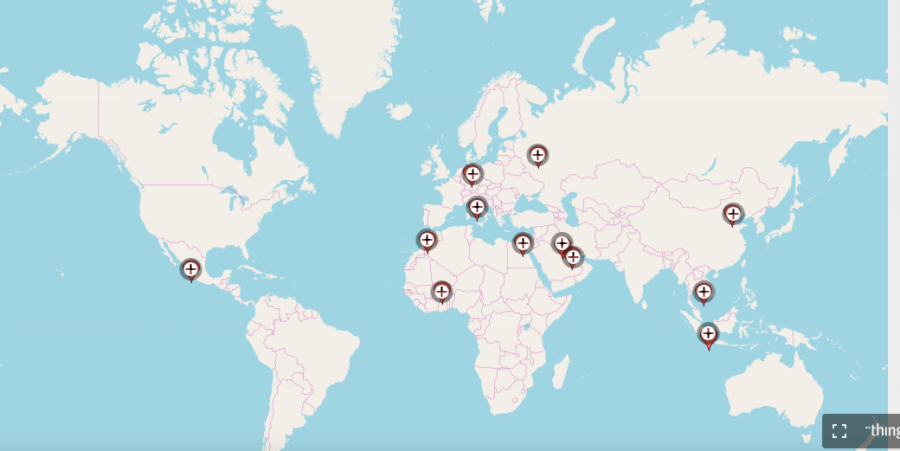Contrasting culture across countries
Arlington is a diverse area– there are students who have lived all over the world, whether because they grew up in another country or they moved abroad for their parents’ jobs. Moving anywhere can be a difficult experience, but moving to another country can be especially difficult. While many students described moving abroad and experiencing a new culture as an amazing experience, the initial move and adjustment can be difficult.
“When you leave home, and you leave everything that you’ve ever known behind, you have to put full faith in people you know nothing about,” English teacher Ms. Shayma Al-Hanooti, who taught abroad in Honduras for two years, said. “There’s such a level of trust and humanity.”
Additionally, students have the pressure of adjusting to a new school system. In many countries, language education is completely immersive, students may have less freedom to choose their own classes and the college application process and testing may be different.
“I can’t help but compare how easy it is here,” senior Vi Lim, who grew up in Cambodia, said. “We would have monthly tests and because there were 13 subjects, it would be a full week of testing. We had two weeks to learn new materials, a week of reviewing those materials and a full week of testing, which is so inefficient. In Cambodia it’s all free response and they expect you to respond exactly as the textbook says. It’s very strict in that aspect.”
Some students mentioned that the schools they went to overseas had international events with the goal of helping students adjust and feel accepted in a new place. Teachers can also help students adjust to living in other countries by learning about students’ cultural backgrounds and integrating other cultures into their lessons.
“I really try to diversify what we’re reading and what we’re listening to,” Ms. Al-Hanooti said. “In general, [teachers can] diversify texts so that students can see more of themselves in what we read and what we discuss.”
Moving to a country that has another dominant language other than English can be especially difficult because students may struggle to communicate with others in the country. People said they learned to appreciate simple things involving communication, such as understanding street signs.
“Feeling those challenges of having limited communication, especially as an English teacher, where communication is something that I’m so accustomed to having a pretty good handle on,” Ms. Al-Hanooti said. “It’s very humbling.”
Communication goes beyond just language, however. Body language and methods of communication vary in other countries, so even in countries where students knew the language, communication could still be an issue.
“Sometimes people can have misunderstandings that come from cultural differences,” senior Abby Lewis, who lived in Egypt and studied abroad in the Philippines, said. “There are some things that are considered acceptable in some cultures but considered rude in others. Americans are super direct, [so] certain ways that you communicate your feelings have to be different in different cultures. People communicate differently, and it takes some adjusting.”
When students go to international schools or other diverse high schools, they may find comfort in meeting others who have similar experiences. However, students mentioned that it is important to meet people with other cultural backgrounds as well.
“In the Philippines, I was the only American at my school, but there was one German exchange student and our cultures are different, but similar enough,” Lewis said. “It feels nice to have someone who you can relate to [however], if you’re surrounded by everybody who grew up in the exact same way that you did, you’re not really growing or understanding anything about anybody.”
Living abroad gives people a chance to meet new people and experience other cultures. Many said that living abroad helped them view American culture through a new lens, which helps understand people’s cultures.
“I saw, in contrast, how individualistic American society is,” Ms. Al-Hanooti said. “[The] individualistic mindset in America is the norm to succeed in classrooms. That’s one of the frustrating things I find about American culture. It can be really cutthroat, students are super competitive and there isn’t this collectivist mindset that we sorely lack.”
However, even though cultures vary in many aspects, there are many similarities between cultures in the United States. and in other countries. When people assume others have very different lives than themselves simply because they live in another place, it leads to generalizations and stereotypes.
“I’m an American who grew up in an American family, but I just assumed that everybody would know that Egypt wasn’t like Ancient Egypt,” Lewis said. “People would ask me ‘Did I live in a pyramid?’ [or] ‘Did I ride a camel to school?’. People thought it was like in the cartoons or ancient Egypt. Someone [even] asked me if I spoke hieroglyphics.”
Stereotyping people in other countries is not just an issue in the U.S., as people in other countries often stereotype American culture as well. Students said that especially because the United States is often involved in foreign affairs, people in other countries often have views on the United States.
“Misinformation gets spread everywhere,” Leanne Woolsey, who lived in China, said. “A lot of people treat [my friends who still live there] poorly [and] they think they’re stupid because they’re from America.”
Living abroad gives students a unique perspective that can be advantageous in school. They have first-hand experience when learning about things such as culture, geography and history.
“[Living in China] has given me a different perspective,” Woolsey said. “When learning about climate change, for example, I know how that’s affected China, especially Beijing with pollution and heatwaves.”
Students and teachers also mentioned that when they live abroad, they meet people from all different backgrounds, causing them to be more empathetic and helping them understand other people’s values and cultures.
“I was exposed to so many different things. I saw so many different ‘normals’,” Lewis said. “I was less phased when someone grew up in a different community than I did. When I was in Egypt, I had this one friend who lived in a house with no running water. That was her world. Totally different than the world of my friend who was [an] Italian diplomat’s daughter.”
Most students agreed that living abroad gave them unique experiences which have given them a unique outlook on the culture of both the United States as well as other countries, and shaped their identity giving them a unique outlook on life.
“Living internationally, [being] American became my main identity because it was something that set me apart from other people and it affected how [others] perceived me,” senior Emma Stier, who lived in Mexico, Russia and Burkina Faso, said. “Because of that, I’ve thought a lot about what America is and what it means to be American.”











